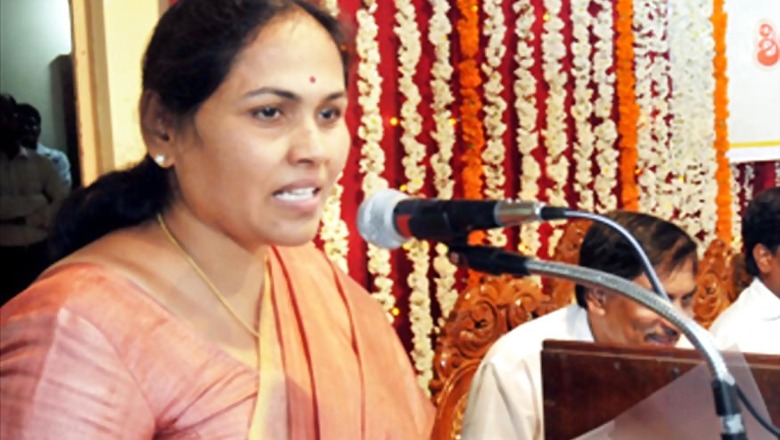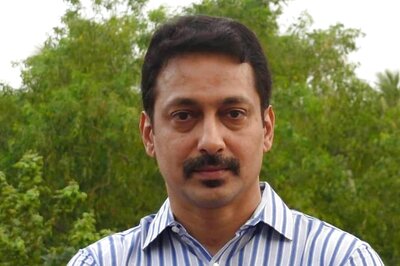
views
Bengaluru: "If there is a house that women belong to, it is the Parliament House," says activist Tara Krishnaswamy, on the raison-d-etre for 'Shakti’, a campaign she launched in December 2018, ahead of Lok Sabha polls.
Despite comprising almost half the population, only 66 women were elected in the 16th Lok Sabha polls in 2014.
An articulate campaigner, Krishnaswamy, felt the need to do something about the unequal gender representation in the Lok Sabha. In December 2018, she co-founded 'Shakti - Political Power for Women'. Since then, the collective has been busy campaigning online and offline to create awareness on the need to get more women into the country's highest policy-making body.
It started with a campaign to get people from across the country to call their MP and ask them to support the Women's Reservation Bill, which has been in cold storage for two decades now. Recently, on 'International Women's Day' on March 8, they launched a coordinated campaign across 19 cities asking political parties to give more representation to women in their choice of candidates for the Lok Sabha polls.
"In the first Parliament, there were around 22 women. Now we have about 66. So we have increased by only about 42 in 67 years. In other words, if you don’t do anything at all, you are not even adding one more woman a year to parliament. Voters need to be made aware, working with political parties hand in hand, to request them and petition them to give more representation to women. Within the party, women must have power," Krishnaswamy says.
The campaign has borne results to some extent. At least two regional parties, the Biju Janata Dal and the Trinamool Congress, have both said they will field more women candidates. The BJD has committed to one-third of its candidates being women, while the TMC has announced nearly 40% of its candidates are women.
But not all parties are willing to do this, as they base their candidate selection on 'winnability.'
JD(S) patriarch 86-year-old Deve Gowda, who first brought in the Women's Reservation Bill in Parliament in 1996, admits that women outshine men when it comes to attendance and participation in debates in the Lok Sabha. But unless all parties are forced to field women, a few parties cannot take this 'gamble' of fielding women against male candidates, he feels.
He brought in reservation in the local governing bodies in Karnataka, a robust system that still functions. The Bruhat Bengaluru Mahanagar Palike (BBMP), for instance, has 102 women among the 198 corporators.
"If the reservation in Parliament is not possible, the Election Commission can bring a simple modification that one-third of the seats be reserved for women by all parties. Simplification of constitutional amendment is another way. If the parties want to retain their recognition then they have no other option. This will ensure women representation," says the former prime minister.
His move to bring in reservations for women in local governing bodies, like the zila panchayats and corporations ,initially led to women being 'proxies' for their husbands. Their husbands would still make the policy decisions, while women sat at meetings and signed documents they were told to. But things have changed over the years. Many of the elected women representatives go out on inspections. Many have served as mayors in Bengaluru.
They might be confronted with patriarchy and misogyny on a daily basis or need to work harder to be taken seriously, but they are here to stay. Such is the story of Congress corporator and former mayor Padmavathi.
"It is in speeches that they say women must come forward and they would support women. In meetings we can speak only when they want us to. When a taxation committee was being formed with women, they said how could women do finance. I had to fight to present the budget. I wanted to but I couldn't," recalls Padmavathi.
Shobha Karandlaje, the firebrand MP from Udupi-Chikmagalur known for her record 99% attendance in Parliament, has always fought against the relegation to 'women-oriented roles.' Even when women are capable, they are rarely given important portfolios in the Cabinet.
"When they are forming the ministry, women always get Women and Child Development, Kannada Culture Portfolios. I argued that I can perform in other ministries too. You can give Women and Child development to a male. I can perform in other departments better. That’s why I got Rural Development and Energy portfolio. I worked doubly hard to prove that I can perform in any department and in the party. Again and again we have to prove ourselves in cabinet and party meetings," says Karandlaje.
Rising to being an MP has come with its own cost - she never married, as politics is a 24x7 job. She has faced many taunts and allegations about her political growth.
"Political families support their family members – their daughter or wife or somebody else. I am from a small farmer family. Survival in politics is difficult. When there is an allegation I should face it myself, there is no family support. Women are scared of allegations, scared of the politics because of money and muscle power, dirty politics. That’s why many women are running away from politics because they cannot survive in Indian political system," Karandlaje feels.
Those who have managed to survive are often from politically influential families - and so you have the daughters and wives of tall leaders often finding space in the Lok Sabha.
But even dynasts are not spared the misogyny. Soumya Reddy, the debutant MLA who is one of the only ten women in the 225-member Karnataka Assembly, was an environment and citizen activist for many years before she entered the Assembly last June.
Her entry was certainly helped by the fact that her father is former Home Minister Ramalinga Reddy. And though both father and daughter are well-known faces in their constituencies, she come across people who reinforce the patriarchal mindset.
"The day before yesterday, I was in some event and somebody was introducing me as MLA and the people were like 'Where?' And then they said "lady, lady MLA". And of course, there is a lot of mansplaining as well. Because at the end of the day it is unfortunately a patriarchal society and politics is mostly full of men," she says.
"People are not used to women being assertive. They expect women to be submissive, obedient and not opinionated. Look at the representation. We are glad we have reservation in local bodies," she says.
A UN report last May said their study of women legislators in Legislative Assemblies in India between 1992 and 2012 shows women to be more effective than men at increasing economic growth in their constituencies. They are also less likely to have criminal charges against them or exploit their office for personal financial gain.
Women MPs were found to be more conscientious – skipping less than 10% of the sessions and participate actively in debates. In political parties, women are needed to gather votes, to campaign, to organise, for ceremonial and administrative roles - but are usually dumped in the 'mahila morcha' wings for party work.
In the last twenty years, the best representation women have received from the two major national parties is 13 per cent of the tickets.
"When I see ballots containing 92% male names, it sends a clear indication that women have no place in making policies. Men are making all the policies," says Tara Krishnaswamy, co-founder.
Over the last couple of months, her 'Shakti' movement has captured the minds of many young women, who too see themselves as netas in future. Like Shalome Gowri, a researcher for the campaign.
"We were part of the research team and we looked at the figures of every party, every state. It is so low. It is so pathetic. The women MLAs and MPs are in single digits in most parties while men are in hundreds. Some parties even have zero female lawmakers. How can you submit a candidate list with zero women in it? That’s what really changed my mind," says Gowri.
"The male hierarchy does not want women to be in power. When women are in power, they will think about drinking water and food. When men are in power, they will think about metro and airports. Men want maximum benefit out of projects but women will deal with the basic issues. That is why they don't want women in power," says Anil Jose, a Kerala- based activist.
If the legislation has been kept pending for all of 20 years, it is only because political parties, even the ones that speak of equal opportunities for women, don’t really mean what they say. India is still at least a generation behind nations like Germany and Australia, in empowering women in politics.
"If you look at 25 years of panchayat raj, when the reservations first came up, the first set of women who came were hugely dependent on family structure. They were looking up to men in their lives for managing the village or the area or ward. Now more and more women have agency, more women are becoming independent,” says Krishnaswamy.
She adds that in the last 25 years, there have been extraordinary sarpanchas and panchayat leaders and the majority in that position are doing a great job. They may be restricted but that is because the men restrict them from going out of the house.
“That is a male problem and not a female problem. That’s not the problem of the women doing the job. It’s the problem of men not allowing them to do their job. You got to fix it elsewhere," she says.
She hopes this year there will be better representation for women in the 17th Lok Sabha and the Bill would get get passed, despite all the nay-sayers for the reservation over two decades.
"When you solve a quantity problem, you just open doors. As more and more quantity comes in, the law of averages applies. The best will automatically float to the top. Why would a woman want to improve her political quality if she is never given a ticket to contest, never given a ministerial job? First make sure those jobs are available to them, then you will see good women come forward," Krishnaswamy concludes.




















Comments
0 comment